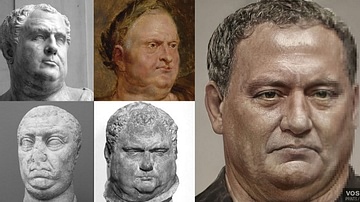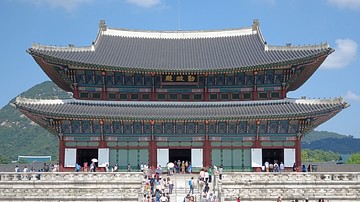Search
Did you mean: Tsar?
Search Results

Image
Vitellius (Artistic Facial Reconstruction)
A photorealistic representation of what the Roman emperor Vitellius (r. 69 CE) may have looked like. Pictured alongside the reconstruction are the artworks and statuary used as references. From left to right and top to bottom are the Louvre...

Image
Yule Bonfire
Modern-day Yule bonfire in Sweden.

Image
Maypole
The phallic symbol known as the Maypole, which is decorated with long strands of ribbon that participants would hold onto as they dance, evolved from the Celtic Beltane rituals.

Definition
Roman Constitution
Roman constitution was an accumulation of laws, legal decisions, and ancient customs. While today 'constitution' usually refers to a single act of legislation, this was not the case in ancient Rome. Instead, Roman government relied on the...

Definition
First Continental Congress
The First Continental Congress was a meeting of delegates from twelve of the Thirteen Colonies of British North America that gathered in Philadelphia, Pennsylvania, from 5 September to 26 October 1774. Its primary purpose was to coordinate...

Definition
Early Joseon Period
The Early Joseon Period (1392 - c. 1550 CE) in Korea was bookended by internal power struggles but witnessed major scientific and societal advances and prosperity. The Joseon (Choson) Dynasty ruled Korea from 1392 CE to 1897 CE, and scholars...

Definition
King Egbert of Wessex
Egbert of Wessex (l. c. 770-839 CE, r. 802-839 CE; also given as Ecgberht, Ecbert) was the most powerful and influential king of Wessex prior to the reign of Alfred the Great (r. 871-899 CE). Egbert came to the throne at a time when the neighboring...

Definition
Roman Gaul
Roman Gaul is an umbrella term for several Roman provinces in western Europe: Cisalpine Gaul or Gallia Cisalpina, comprised a territory situated in the northernmost part of the Italian peninsula ranging from the Apennines in the west northward...

Definition
Tiglath Pileser III
Tiglath Pileser III (745-727 BCE) was among the most powerful kings of the Neo-Assyrian Empire and, according to many scholars, the founder of the empire (as opposed to the claims for Adad Nirari II (912-891 BCE) or Ashurnasirpal II (884-859...

Definition
Walter Raleigh
Sir Walter Raleigh (c. 1552-1618 CE) was an English courtier, soldier, mariner, explorer, and historian. A one-time favourite of his queen, Elizabeth I of England (r. 1558-1603 CE), Raleigh organised three expeditions to form a colony on...